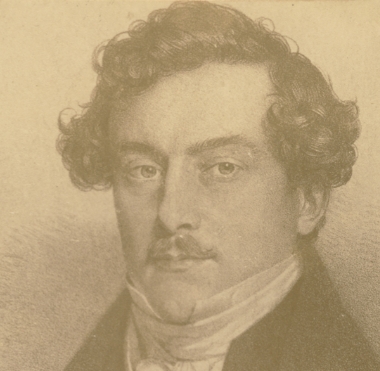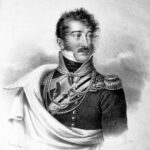Oppersdorff, who commissioned two of Beethoven’s Symphonies, but ended up with only one dedication. A man, who probably saved Beethoven from jail. Who was this patron?
Who was Franz von Oppersdorff?
Count Franz von Oppersdorff (1778-1818) was a nobleman from Silesia, a historical region that lies mostly in Poland, partly in Czech Republic and Germany. The family estate was in Oberglogau (today Głogówek), a place Beethoven visited and stayed for some time.
Oppersdorff maintained a private orchestra in his castle, where the musicians doubled as household officials (not uncommon at the time). He was, above all, a lover of music and a patron of Beethoven.
His taste in music and eye for talent further confirmed by the fact that he launched the career of Johann Sedlatzek (1789-1866), a flautist and composer. Sedlatzek, once a tailor’s apprentice, became a European celebrity, referred to as the Paganini of Flute.
Oppersdorff also made a bit of a history by connecting the two musicians that led to fruitful cooperation and friendship. Sedlatzek was part of the orchestra that performed the premier of Beethoven’s Ninth Symphony.
Oppersdorff saves Beethoven from jail
Prince Lichnowsky and Oppersdorff were friends and had estates close to each other. It was Lichnowsky, who introduced Oppersdorff to Beethoven.
In the autumn of 1806 the composer spent a working holiday at Lichnowsky’s castle, where one day French officers came to visit. The host asked (ordered?) Beethoven to play and entertain his guests. He refused, declaring he was no servant and will not be ordered to do anything. The prince, long time patron of the musician, did not take the humiliation lightly. He demanded a play. Beethoven stormed into his room, and locked his door. Lichnowsky followed him and kicked the door in, screaming.
According to one version of the event, the angry musician behind the door was swinging a chair over his head, ready strike if the prince enters the room. Oppersdorff jumped between them and calmed the situation. This act most probably saved Beethoven from trouble and a possible jail time.
We do not know what the exact threat from Lichnowsky was, but we do know that later Beethoven in one of his letters wrote about some “people who like to belabor their friends with flails.”
Oppersdorff as patron and commissioner of symphonies
When Oppersdorff and Beethoven met, the former already had been familiar with the composer’s music. In fact, when he first visited the Count at his castle, he made the orchestra ready and they performed his Second Symphony – in the honor of the guest. It is very likely that the enthusiastic Oppersdorff right then and there commissioned two new symphonies from Beethoven, the Fourth and Fifth.
These two, Beethoven finished in amazing pace (in this period his productivity is beyond imagination). In November 1806 , he wrote Oppersdorff about the offer he received from Jérôme Bonaparte, and next March he already reports about the last movement of “your symphony” (the Fifth), saying “The last movement of the symphony has three trombones and a piccolo—and, although, it is true, there are not three kettledrums, yet this combination of instruments will make a more pleasing noise than six kettledrums.”
After this, something happened with Beethoven or between the two, because in November the composer informs Oppersdorff that, “You will probably have formed an unfavorable impression of me. But necessity drove me to hand over to someone else the symphony which I composed for you [the Fifth], and another one as well [the Sixth]—Rest assured, however, that you will soon receive the symphony which is specially intended for you [the Fourth].”
After this move by Beethoven there is no evidence of communication between the two. Oppersdorff commissioned two, the Fourth and Fifth symphonies (probably 500-500 florins each), but ended up only with the dedication of the Fourth. The Fifth Symphony was finally dedicated to Prince Lobkowitz and Razumovsky.








